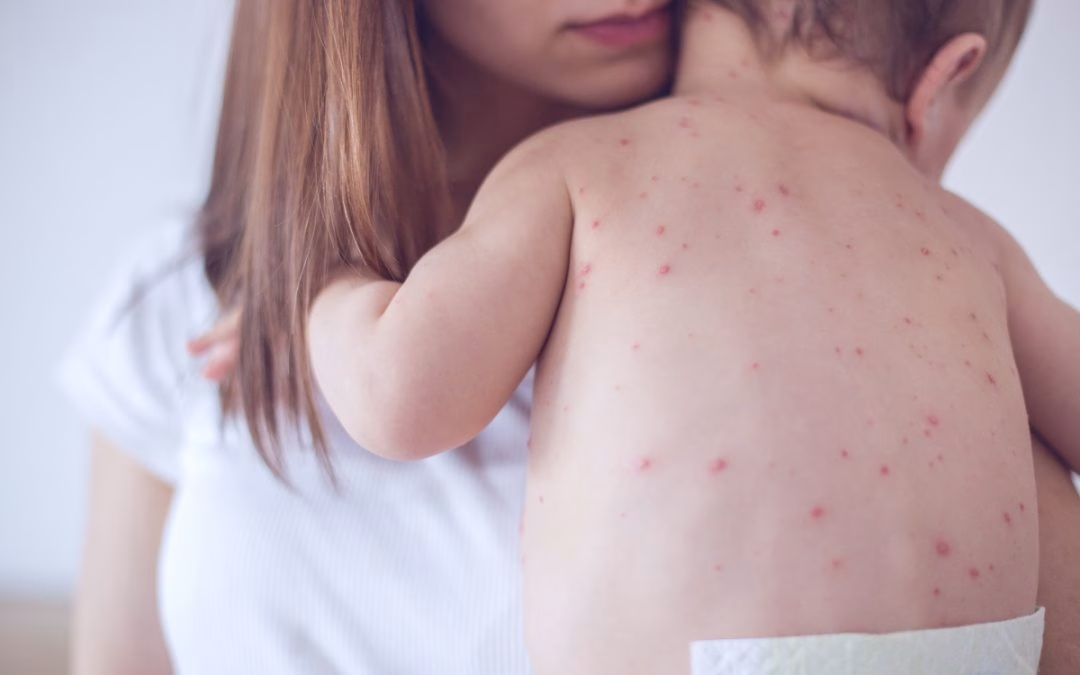
On a sunny afternoon at Birkdale Village, families stroll between shops, grab ice cream at Kilwins, and enjoy everything our vibrant Huntersville community has to offer. But even in the midst of these everyday moments, a serious health concern is quietly growing across parts of the country: measles. With outbreaks reported in states like Texas, Oklahoma, and New Mexico, it’s important for families to understand why measles is on the rise and how vaccination can help keep our community safe.
What Is Measles?
Measles, also known as rubeola, is a highly contagious viral infection that mainly affects the respiratory system. It spreads easily through coughing, sneezing, or even simply breathing the same air as an infected person. In fact, the virus can linger in the air and remain infectious on surfaces for up to two hours after an infected person leaves a space.
Symptoms typically develop 7–14 days after exposure and often include:
- High fever (often over 101°F)
- Cough, runny nose, and red, watery eyes (commonly called the “three C’s”)
- Tiny white spots inside the mouth known as Koplik spots
- A distinct red rash that starts on the face and spreads downward
While measles can cause serious discomfort, it can also lead to dangerous complications such as pneumonia, brain swelling (encephalitis), and even death, particularly in young children, pregnant women, and those with weakened immune systems.
Why Are Measles Cases Rising?
Although measles was declared eliminated in the United States in 2000, recent years have seen a troubling resurgence. Several factors contribute to the current rise in measles cases:
- Declining Vaccination Rates: Misinformation about vaccines, vaccine hesitancy, and disruptions to routine healthcare during the COVID-19 pandemic have all led to a drop in immunization coverage.
- Global Travel: Travelers can unknowingly bring the virus back from countries where measles is more common, leading to outbreaks in local communities.
- Community Vulnerability: Measles spreads quickly when vaccination rates drop below 95%, the level needed to maintain “herd immunity.”
Because measles is so infectious, up to 90% of unvaccinated people exposed to it will become ill, keeping vaccination rates high is critical to preventing outbreaks.
How Measles Spreads
Understanding how measles spreads underscores just how important vaccination and prevention are:
- Airborne Transmission: Measles travels through respiratory droplets released when an infected person coughs or sneezes.
- Surface Contamination: The virus can survive on surfaces and objects for hours, making shared spaces like shopping centers and playgrounds risky during outbreaks.
- Direct Contact: Physical contact with an infected person or their belongings can also lead to transmission.
Even a brief exposure in a public space can result in infection, especially for those who are unvaccinated.
How Vaccination Protects Your Family
The most effective defense against measles is the MMR vaccine, which protects against measles, mumps, and rubella. Two doses of the MMR vaccine are about 97% effective at preventing measles.
Typically, children should receive:
- The first dose between 12–15 months of age
- The second dose between 4–6 years of age
Adults who have not been vaccinated, or are unsure of their vaccination status, should talk to a healthcare provider. In some cases, adults may need an MMR booster, especially before traveling internationally or during outbreak situations.
Vaccination not only protects the individual receiving it but also helps protect those who cannot be vaccinated, such as infants under 12 months old and individuals with certain medical conditions.
Other Steps to Stay Safe
In addition to getting vaccinated, these simple actions can help reduce the spread of measles:
- Isolation: If someone shows symptoms of measles, they should be isolated immediately and evaluated by an AFC healthcare provider.
- Masking and Hygiene: Wearing a mask, washing hands often, and disinfecting commonly touched surfaces can help limit the virus’s spread.
- Medical Consultation: Early detection and medical guidance are key to stopping outbreaks in their tracks.
If you suspect measles exposure or symptoms, call ahead before visiting to prevent exposing others in the waiting area.
How AFC Huntersville Can Help
At our clinic, we are committed to keeping our community safe and healthy. We offer MMR vaccinations for children and adults and can review your immunization records to ensure you and your family are fully protected.
If you are unsure about your vaccination status, need a catch-up dose, or have concerns about symptoms, our knowledgeable healthcare team is here to help. Walk in or schedule an appointment at your convenience with no lengthy wait times necessary.
Final Takeaway
The rise in measles cases across parts of the country is a serious reminder that vaccine-preventable diseases are still a threat when immunization rates fall. Protecting yourself and your loved ones starts with staying informed and making sure your vaccinations are up to date.
By taking preventive action now, we can help keep Huntersville safe, healthy, and thriving. AFC Huntersville is proud to stand with you in safeguarding the health of our vibrant community, one vaccine at a time. Visit us today.